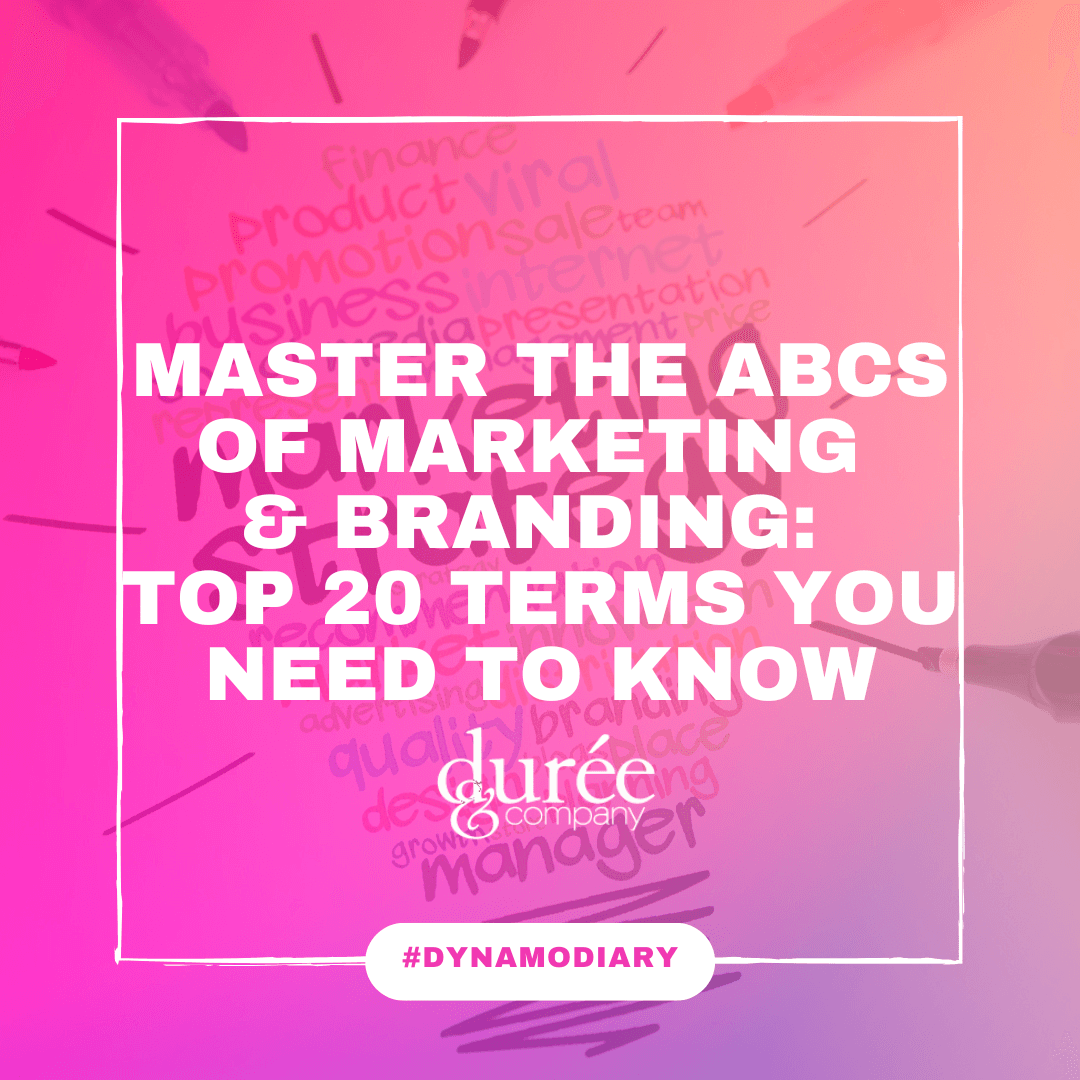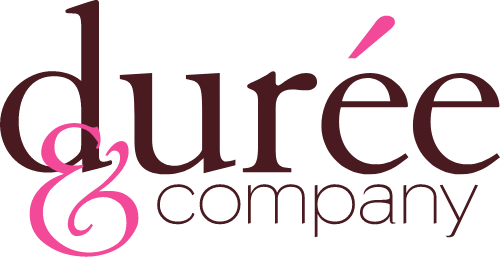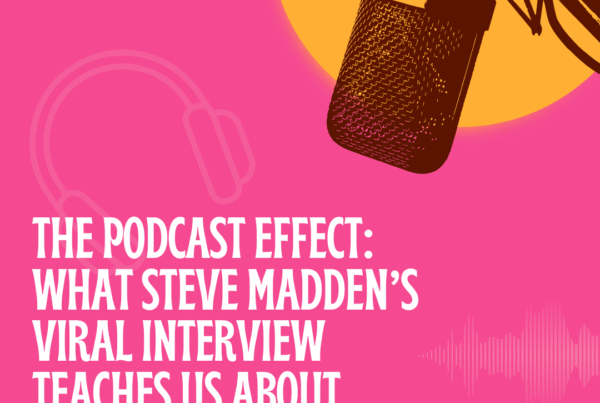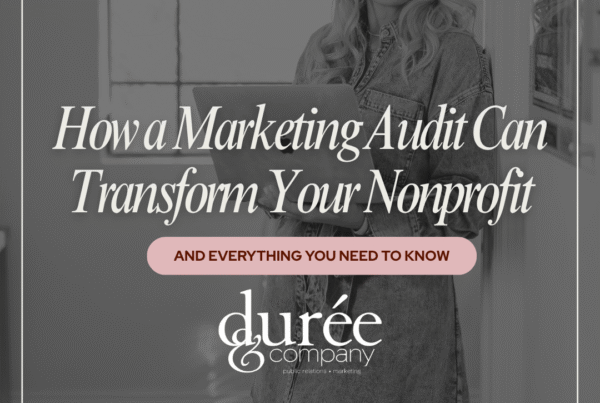
Navigating the world of marketing can be overwhelming, with countless acronyms and jargon. At times, it may seem like marketers speak an entirely different language. However, effective communication is key to ensuring that clients fully understand the marketing strategies and ideas being presented.
At Aspen- and Fort Lauderdale-based public relations agency Durée & Company, we believe in communicating with clients and breaking down the terms to help companies make informed decisions. While the vast marketing discipline covers everything from strategy and branding to advertising, social media, analytics, email, research, digital, and more, we strive to simplify our knowledge to make it more accessible to everyone.
One way to create a better understanding is by breaking down some of the most common marketing terms. Here are a few of our favorites:
- Advertising: Advertising is the paid promotion of products, services, or brands through various channels, including television, radio, print media, or digital platforms, with the primary goal of creating awareness and interest to increase sales or brand recognition. Advertising is a marketing strategy that aims to reach a target audience and persuade them to take a specific action, such as purchasing a product or service.
- Analytics: Analytics is the process of using data to uncover patterns and insights. For example, many marketers rely on Google Analytics to collect website data to make informed decisions.
- Brand: A brand makes a company, product, or service unique. It includes the logo and visual identify, reputation, and beliefs. It’s what consumers think and feel when they interact with the brand.
- Brand awareness: Brand awareness refers to how well people can identify and recall a brand when they come across it in different contexts, such as seeing a logo or hearing a name.
- Branding: Branding is the process of creating and managing a brand. Branding is how companies make themselves distinctive and memorable through a name, logo, tagline, and visual/verbal elements. Branding aims to create a unique and memorable consumer interaction that resonates with the audience and helps build loyalty and trust.
- Brand position: Brand position refers to the unique place a brand occupies in the mind of its target audience based on how it differentiates itself from its competitors. Ultimately it is what sets a brand apart.
- Call-to-action (CTA): A call-to-action is a request for a buyer or seller to take a specified action. For example, sign-up, call, or make an appointment.
- Content marketing: Content marketing uses engaging and informative material to keep a particular group interested in a brand and drive sales. It can be anything from blog posts and videos to infographics and e-books.
- Content strategy: Content strategy entails making a plan for how to create, organize, and share information (like articles, videos, and social media posts) that helps a business to reach its goals and meet the needs of its audience.
- Conversion rate: Conversion rate is the ratio between the number of people who complete a desired action on a website (i.e. make a purchase) and the number of people who visit the website.
- Customer Persona: A fictional representation of a brand’s ideal customer, created by analyzing customer data and behavior to better understand their demographics, preferences, and needs.
- Digital marketing: Digital marketing is the use of digital channels, such as search engines, social media, email, and websites, to promote products or services. Digital marketing allows companies to reach a wider audience, track and measure the effectiveness of campaigns, and engage with customers in real-time.
- Influencer Marketing: A type of marketing where a brand partners with a social media influencer to promote their product or service to the influencer’s followers.
- Key performance indicators (KPIs): KPIs are measurable metrics that help marketers track and evaluate the success of their marketing campaigns. For example, KPIs might include website traffic, lead generation, conversion rates, and customer retention.
- Lead generation: Lead generation refers to the process of attracting and converting potential customers into leads, typically through tactics like website forms, landing pages, and gated content.
- Market Research: The process of gathering and analyzing information about a market, including customer needs and preferences, competitor strategies, and industry trends. Market research is used to inform marketing strategies and decisions.
- Search engine optimization (SEO): SEO is the practice of optimizing a website to improve its visibility and ranking in search engine result pages (SERPs). This includes tactics like keyword research, on-page optimization, and building high-quality backlinks.
- Segmentation: The process of dividing a market into smaller groups of consumers with similar needs, characteristics, or behaviors. Segmentation is used to create targeted marketing campaigns that are more likely to resonate with specific audiences.
- Social media marketing: Social media marketing involves using social media platforms like Facebook, Instagram, TikTok, LinkedIn and Twitter to promote a brand or product. Social media marketing can be an effective way to engage with potential customers and build brand awareness.
- Target audience: A target audience is a specific group of people that a marketing campaign is designed to reach. Target audiences are typically defined by factors like demographics, interests, and behavior.
It’s important to understand the language of marketing to make informed decisions and develop effective strategies that resonate with target audiences. As a leading marketing agency, Durée & Company believes in breaking down complex marketing terms and concepts to make them more accessible to clients. The terms listed above are just the tip of the iceberg, but they are a great starting point for anyone looking to gain a better understanding of marketing and branding. By mastering these terms, a brand will be well on its way to achieving its marketing goals and reaching the target audience. Need help developing and executing your marketing strategy? Contact us today!
About Durée & Company
Durée & Company, Inc. is an award-winning, full-service public relations, marketing and special events firm founded in 1999. The firm has offices in Fort Lauderdale, Florida, and Aspen, Colorado. Durée & Company serves the corporate, agency and nonprofit practice areas for local, national, and international clients. Services include public relations, social media, marketing, content development, advertising, special events, branding, radio promotions and more. Durée & Company clients include well-known names in business, fashion, hospitality, travel, health and wellness, cannabis and hemp, psychedelics, technology and cryptocurrency, marine and yacht, art and culture, nonprofit organizations, legal and professional services and real estate. Durée & Company is a member of PR Boutiques International™ (PRBI), an international network of boutique PR firms. To learn more, call 954-723-9350; go to dureeandcompany.com; cannabismarketingpr.com; or psychedelicpr.com. Join the social conversation and follow Durée & Company on Facebook, Instagram, Twitter, YouTube and LinkedIn at @DureeCoPR.








